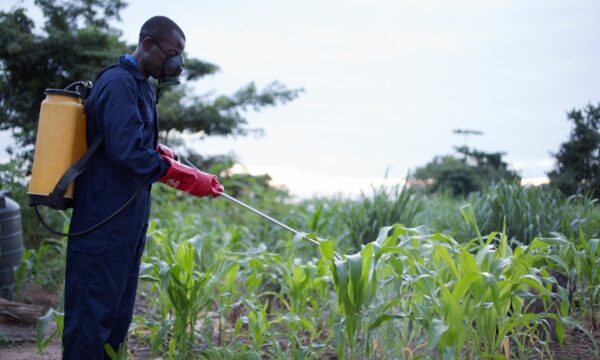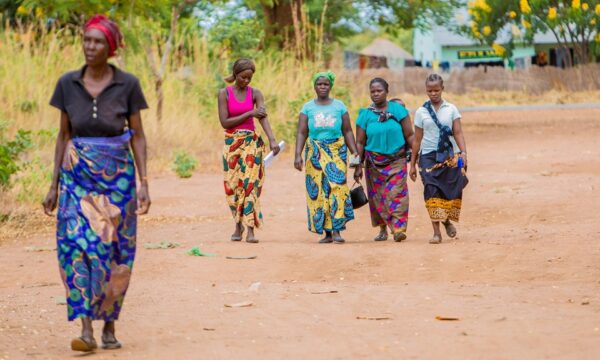
Located in semi-arid Eastern Kenya, Machakos county is home to the Umatui amazing site women group. The group comprises 15 members who mainly grow tomatoes, cowpeas, pigeon peas, and maize. It is among eight other women groups working with Katoloni Community Based Organisation (CBO), a non governmental organization under infonet biovision. The CBO runs a mobile Plant Clinic in Machakos county, Kenya and mostly targets organized farmer groups.
Umatui amazing site women group has benefitted from the county project of green house allocation to farmer groups, where they cultivate tomatoes, employing the basic skills provided by an extension officer from the Ministry of Agriculture. Initially the crop was doing well but just before harvest they noticed big leaf mines, and assuming that they were caused by leaf miners, sprayed chemical insecticides. The tomato plants however started drying up, with the fruits developing black spots which later turned into caterpillar-infested rots. They further misdiagnosed this as tomato blight and applied fungicides which did not work and the tomato crop deteriorated even further leading to worry and frustration among the farmers.
It was at this point that one of the group members said she had discussed the issue with one of her friends and was told the problem could be solved in a ‘Plant Clinic’. This was a new concept to the group, not having heard about it before. However, they decided to give it a try, having exhausted all other options. Armed with a leaf sample of the affected crop, the group’s chairlady Mrs. Florence Koki attended a plant clinic session organized by Katoloni CBO at Mutituni Market. The plant doctor, Mr. Anthony Musili, who also doubles up as a Biovision Community information worker diagnosed the problem as Tuta absoluta. Together they organized a farm visit to assess the extent of damage by the pest and consequently find recommendations for management. At the time of the visit to the greenhouse, the tomatoes were already at the harvest stage which meant that sadly the crop for that season could not be rescued.

Inside the greenhouse with blue and yellow sticky traps
However, the plant doctor recommended crop rotation with kale in the subsequent season and advised the farmers on various cultural practices to control pests and diseases in the green house. Among these were: preparation of plant extracts and spraying them on infested crops, regular monitoring for pests and diseases, and proper spacing. Upon harvesting the kale, the farmers planted their tomatoes, this time following the plant doctor’s advice. They used a Tuta trap at germination stage to monitor the presence of the pest as well as control its invasion. Together with the plant doctor’s assistance, they prepared plant extracts from African marigold, Tithonia, Lantana camara, and garlic which they used for spraying. The tomato crop was also infested with Thrips and White flies, and so the plant doctor advised the use of blue sticky traps and yellow sticky traps for control of these two pests, respectively. These technologies worked very well and the group doubled their income from KES 15,000 in the previous season to KES 30,000.
Since then, the members of the Umatui amazing site women group have shared their experiences and the benefits of plant clinic advice with other groups. As a result, other farmer groups have also had sessions with the plant doctor and visited the plant clinic. In addition, the group now use organic pesticides made from plant extracts as opposed to the chemical pesticides they were using before.
Plantwise strives to empower rural communities from within by giving all farmers the knowledge and skills they need to lose less and grow more.

Plant doctor Mr. Anthony Musili helps the Umatui amazing site women group prepare their plant extracts
This article has been written in support of International Day of Rural Women, recognised on 15th October.
“The empowerment of rural women and girls is essential to building a prosperous, equitable and peaceful future for all on a healthy planet.”
— UN Secretary-General, António Guterres
1 Comment
Leave a Reply
Related News & Blogs
How do pest risk registers address the spread of plant pests in Africa?
Pest risk registers can help to solve problems in agriculture, addressing the growing global threat of plant pests. Moreover, changing weather patterns, led by rising temperatures, are causing them to reproduce faster and expand into new regions. In ad…
10 July 2025





[…] The Umatui amazing site women group tackle Tuta absoluta […]